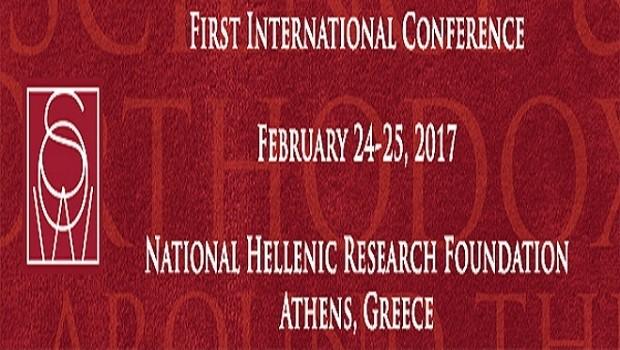Διεθνές συνέδριο για την επιστήμη και την ορθόδοξη παράδοση
Πραγματοποιήθηκε το ΠΡΩΤΟ Διεθνές συνέδριο με τίτλο «Modern Science and the Orthodox Tradition. An uneasy relationship?» που διοργάνωσε το Ινστιτούτο Ιστορικών Ερευνών του Εθνικού Ιδρύματος Ερευνών στο πλαίσιο του επιστημονικού προγράμματος Science and Orthodoxy around the World (SOW), την Παρασκευή 24 και το Σάββατο 25 Φεβρουαρίου 2017 στο Εθνικό Ίδρυμα Ερευνών (Αμφιθέατρο «Λεωνίδας Ζέρβας») Λεωφ. Βασιλέως Κωνσταντίνου 48, Αθήνα
Το Πρόγραμμα Science & Orthodoxy around the World (Επιστήμη και Ορθοδοξία ανά τον Κόσμο – SOW) εστίασε στον διάλογο μεταξύ επιστήμης και θρησκείας στον Ορθόδοξο Χριστιανικό κόσμο. Συμμετείχαν πάνω από 50 ειδικοί από 15 χώρες και από διάφορα ερευνητικά πεδία από τις Θετικές Επιστήμες και τη Φιλοσοφία, μέχρι την Ιστορία, τη Θεολογία και την Εκπαίδευση. Απευθυνόταν σε όλους τους ερευνητές των σχετικών πεδίων, τους μελετητές των σχέσεων επιστημών και θρησκείας σε όλο τον κόσμο, καθώς και σε ένα ευρύτερο κοινό που ενδιαφέρεται για ζητήματα που ανακύπτουν από τις σχέσεις των επιστημών με τη θρησκευτική πίστη. Βασικός στόχος του Διεθνούς Συνεδρίου ήταν επίσης, να φέρει τον Ορθόδοξο κόσμο στο προσκήνιο της διεθνούς έρευνας των σχέσεων επιστημών της Ιατρικής και της Έρευνας με την Βιοηθική και την θρησκεία. Τέλος, επιπρόσθετος στόχος ήταν η συλλογή, καταγραφή και ανάδειξη των απόψεων και θέσεων που συγκροτούν σήμερα τον διάλογο αυτόν στην Ελλάδα, τη Ρωσία, την Ουκρανία, τη Ρουμανία, τη Βουλγαρία, τη Σερβία και τη Γεωργία, αλλά και στο Ηνωμένο Βασίλειο, τις Ηνωμένες Πολιτείες Αμερικής, τη Γαλλία και την Αυστραλία, μέσα από μια εξειδικευμένη βάση δεδομένων ανοικτής πρόσβασης καθώς και ένα σύνολο προσωπικών συνεντεύξεων.
Στην ημερίδα συμμετείχε ο πανοσ. αρχιμ. Δρ. Θεοδόσιος Μανώλης, Κλινικός Βιοιατρικής Έρευνας και Βιοηθικής Ογκολογίας κληρικός της Ιεράς Μητροπόλεως Ιλίου Αχαρνών και Πετρουπόλεως και τακτικό μέλος της Συνοδικής Επιτροπής επι Ποιμαντικών Θεμάτων και Καταστάσεων της Εκκλησίας της Ελλάδος.
Modern Science and the Orthodox Tradition. An uneasy relationship?
The First International Conference of SOW focuses on the nature of the relationship between modern Science and Orthodox Christianity with its centuries-old tradition. Orthodoxy today shares a variety of —sometimes ambiguous—attitudes towards modern Science shaped by the texts of the Church Fathers, medieval and modern theologians and scholars, as well as contemporary social realities. On the other hand, modern Science, which sprung from the seventeenth-century quest by Western-European philosophers for rationality, is faced with crucial and uneasy questions about the meaning of life and the position of Humankind within the natural world.
The main goal of the Conference is to define the patterns of the Science-religion relationship in the Orthodox world, especially in the light of the most recent trends in both Science and Theology. Is this a relationship of dialog or conflict? Of integration or independence? What is the impact of the revival of patristic studies and new theological currents on the relationship? But also what is the relevant impact of new scientific discoveries on the image of the Human and the Universe? Has the modern Science-religion dialog in the West influenced Eastern Christianity in its effort to create new perspectives and concepts in response to new challenges? These questions are crucial for understanding and mapping the current science-religion dialog in the Orthodox world, and apart from recording given views and opinions, Project SOW aims at inciting new thoughts and ideas in the effort to advance the dialog among all interested parties.
The Conference took place on Friday the 24th and Saturday the 25th February 2017 at the National Hellenic Research Foundation, 48 Vassileos Konstantinou Ave, Athens Greece.
CONCLUSION (ΣΥΜΠΕΡΑΣΜΑΤΑ)
Throughout the centuries, the relations between Orthodox Christianity and science have had a dynamic and complex character. This complexity is attested not only by the variety and the number of relevant texts but also by the various and multiple identities of the people who pro-duced them. From the first encounters of Eastern Christianity with science to our own time, we have witnessed a sort of pendulum movement concerning secular knowledge about nature and the universe. This movement goes from a rational approach to nature in order to glorify God’s creation to various mystical approaches that deny the intermediation of science between man and the created world.Indeed, the intermediation of science between believers and creation, so evident in Western Christianity at least since the late Middle Ages, was a controversial matter in the East. Down through the ages, the stress placed on divine grace as the key notion in the Orthodox doctrine of salvation led to an emphasis on theosis—deification. The theological concept of deification was identified with an ascetic ideal that emphasized a kind of dismissal of the physical world, associated with an undervaluation of discursive and demonstrative reason. Thanks to this domi-nant spirituality—and up until the ascendance of modernity in the nineteenth century—sci-ence and secular knowledge were not conceived by mainstream Orthodoxy as an indispensable intermediary stage in the process of human union with God.


